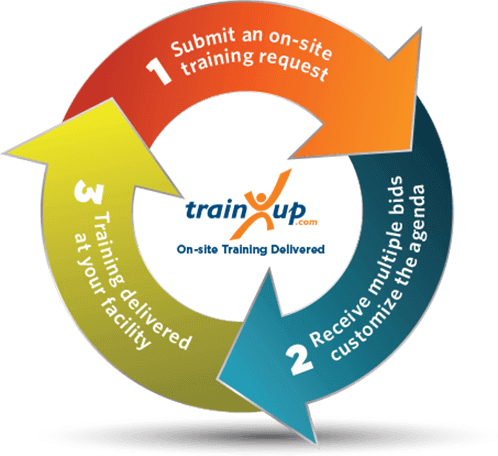
Human Resources Training Your Way
Or Choose From 24 Human Resources Sub-Categories
- ADA-Disabilities Training
- Affirmative Action - EEO Training
- Cafeteria Plan Training
- COBRA Training
- Compensation and Benefits Training
- Diversity Training
- FLSA Training
- FMLA Training
- HIPAA Training
- HR Compliance Training
- HR Generalist Training
- HR Internal Investigations Training
- HR Management Training
- Labor Law Training
- OSHA Training
- Payroll Training
- Personnel Law Training
- PHR - SPHR Training
- Recruiting - Hiring Training
- Sexual Harassment Training
- State Regulations Training
- Work and Life Training
- Workers' Compensation Training
- Workplace Health and Safety Training
Human Resources Training, HR Courses and Seminars
TrainUp.com is your one-stop source for the best virtual human resources training and live courses nationwide. Start your search now and browse among 68 live instructor-led human resources training classes near you, from the industry's best human resources training companies such as SkillSoft, BizLibrary, and Business & Legal Reports, Inc. (BLR) TrainUp.com also lists more than 1444 self-paced online human resources training courses, micro-learning videos, and eLearning bundles. If you have a team to train, we can conduct a course just for you. Check out our onsite on-site human resources training page to request a custom virtual or in-person training quote today.
Request Human Resources On-Site Training. We bring the best instructors to you.
TrainUp.com is your one-stop source for the best virtual human resources training and live courses nationwide. Start your search now and browse among 68 live instructor-led human resources training classes near you, from the industry's best human resources training companies such as SkillSoft, BizLibrary, and Business & Legal Reports, Inc. (BLR) TrainUp.com also lists more than 1444 self-paced online human resources training courses, micro-learning videos, and eLearning bundles. If you have a team to train, we can conduct a course just for you. Check out our onsite on-site human resources training page to request a custom virtual or in-person training quote today.
Live Training
(27 Classes)
Self-Paced Courses
(250 eLearning Courses)
& Video Collections
(133 Bundles)
Up to 37% off Training
Fundamentals of Human Resources Management
Project Team Leadership: Building Commitment Through Superior Communication
Leading in a Diverse Equitable and Inclusive Culture
Achieving Leadership Success Through People
Leading Disruptive Change and Innovation: Your Plan for Breakthrough Growth
Finding Common Ground: How to Overcome Unconscious Bias
Diversity Equity and Inclusion Certificate Program
Certificate Program For HR Leadership ™
Certificate Program In FMLA, ADA, And PWFA Compliance ™
How to Handle Emotionally Charged Situations in the Workplace
Developing Emotional Intelligence
Managing with Assertive Confidence
Time Management for the Overwhelmed
The Controller's Workshop
10-Hour OSHA Safety Training For General Industry
DIY: Running An HR Department Of One
Advanced Internal Investigations Certificate Program ™
Internal Investigations Certificate Program
Certificate Program For HR Generalists ™
Leadership, Team-Building And Coaching Skills For Managers And Supervisors
How to Supervise Bad Attitudes and Negative Behaviors
Leading Leaders: Achieving Organizational Goals Through Others
Adaptability: The Key for Mastering Change
Recruiting Interviewing and Selecting Employees
SMART Performance Management
Understanding Diversity and Inclusion
Determining Which Employees are Exempt under the Fair Labor Standards Act
Uncovering Workers' Compensation Fraud
Understanding HR: Equal Employment Opportunity
Wage and Hour Regulations: The FLSA
Workers' Compensation - A Cost Savings Approach
The Fundamentals of Supplemental Pay Under the FLSA
OSHA and Workplace Accident Investigations: What Every HR Professional Needs to Know
Developing Safety Incentive Programs to Reduce Workers' Compensation Claims
Contested Workers' Compensation Claims
The Relationship Between Social Security, Medicare, and Workers' Compensation Claims
Best Practices in ADA, FMLA, and Workers' Compensation
HR Management (PMBOK® Guide Fifth Edition)
Stakeholder and HR Management PMBOK® Guide Fifth Edition
Improving Your Work Life Balance
Strategic Human Resource Management (HRCI: SPHR-aligned)
Work-Life Balance Video Collection
Human Resource Management for Business
Project Human Resource Management (PMBOK® Guide - Fifth Edition-aligned)
Improving Your Work/Life Balance
Optimizing Your Work/Life Balance
Workforce Planning and Employment (HRCI: PHR/SPHR-aligned)
Employee and Labor Relations (HRCI: PHR/SPHR-aligned)
Risk Management (HRCI: PHR/SPHR-aligned)
Human Resource Development (HRCI: PHR/SPHR-aligned)
Essentials of Interviewing and Hiring
Workplace Diversity - Make it Count
Compensation and Benefits (HRCI: PHR/SPHR-aligned)
Business Management and Strategy (HRCI: PHR/SPHR-aligned)
Recruitment and Hiring Video Collection
Workplace Diversity on the Job
Human Resources Core Knowledge (HRCI: PHR/SPHR-aligned)

Get Up to 20% off Live & Online Training Courses

We’ll Conduct The Course Just For Your Team

Get Up to 20% off eLearning
SCORM /AICC compliant. Upload content to your LMS
We’ll help customize your curriculum. Send us a request today to preview our entire online training catalog

Customized eLearning Solutions
ILT /Virtual Live to eLearning MicroLearning Video Development Mobile Learning Gamified Learning Flash to HTML5 Conversion
TrainUp.com is your one-stop source for the best virtual human resources training and live courses nationwide. Start your search now and browse among 68 live instructor-led human resources training classes near you, from the industry's best human resources training companies such as SkillSoft, BizLibrary, and Business & Legal Reports, Inc. (BLR) TrainUp.com also lists more than 1444 self-paced online human resources training courses, micro-learning videos, and eLearning bundles. If you have a team to train, we can conduct a course just for you. Check out our onsite on-site human resources training page to request a custom virtual or in-person training quote today.

Request Human Resources On-Site Training. We bring the best instructors to you.
HR Courses and Workshops
Human Resources is often tasked with the role of maintaining and improving the workforce, which can include hiring, providing training, and ensuring compliance with labor laws designed to protect workers. Human Resources consists of managing a number of categories for a business, but handling recruitment, interviewing, training, benefits, employee relations, ADA, FMLA/FLSA, EEO, OSHA, and payroll, all while establishing a bond to retain employees. As managing human resources becomes increasingly important to the success of an organization, some businesses are redesigning the meaning of HR through the use of technology and other data programs used to assist in managing human capital.
Related Human Resources Training
- Human Resources training in New York, NY
- Human Resources training in Los Angeles, CA
- Human Resources training in Chicago, IL
- Human Resources training in Houston, TX
- Human Resources training in Philadelphia, PA
- Human Resources training in Phoenix, AZ
- Human Resources training in San Antonio, TX
- Human Resources training in San Diego, CA
- Human Resources training in Dallas, TX
- Human Resources training in San Jose, CA
- Human Resources training in Indianapolis, IN
- Human Resources training in Jacksonville, FL
- Human Resources training in San Francisco, CA
- Human Resources training in Columbus, OH
- Human Resources training in Charlotte, NC
- Human Resources training in Detroit, MI
- Human Resources training in Seattle, WA
- Human Resources training in Denver, CO
- Human Resources training in Boston, MA
- Human Resources training in Oklahoma City, OK
- Human Resources training in Las Vegas, NV
- Human Resources training in Kansas City, MO
- Human Resources training in Atlanta, GA
- Human Resources training in Toronto, ON
- Human Resources training in Vancouver, BC
- Human Resources training
- OSHA training
- State Regulations training
- Compensation and Benefits training
- Recruiting - Hiring training
- Labor Law training
- Work and Life training
- HR Management training
- Workplace Health and Safety training
- COBRA training
- ADA-Disabilities training
- Affirmative Action - EEO training
- Cafeteria Plan training
- Diversity training
- FLSA training
- FMLA training
- HIPAA training
- PHR - SPHR training
- Payroll training
- Workers' Compensation training
- Personnel Law training
- Sexual Harassment training
- HR Generalist training
- HR Compliance training
- HR Internal Investigations training
Training for human resources professionals may vary depending on the desired role. You may need less training for a role as an HR coordinator, versus a role as a manager or director. However, for most HR roles, training covers the main contemporary HR issues. These include organizational theory and organizational behavioral science, legal issues in HR management such as federal and state employment laws, performance management and assessment, employee training and development, as well as compensation and benefits.
Training is one of the key human resources functions. Training itself is the transfer of knowledge in an attempt to improve or develop skills in an employee on the job. The end goal is to improve competancy, confidence, performance and productivity. In human resources specifically, professionals are trained on organizational behavioral science, legal issues in HR such as federal and state employment laws, performance management, feedback and assessment techniques, employee training and development, as well as compensation and benefits.
According to sources such as Indeed.com and Glassdoor.com, the average annual salary for an HR professional in the United States is $70,000, while the U.S. Bureau of Labor Statistics reports that the median salary for an HR manager is $106,910. How much you earn correlates to your role within human resources. Managerial roles require more education and training, however these roles pay higher salaries than entry level HR positions.
HR training is extremely important because it provides opportunity and structure for the development of human resources professionals. There are many skills an HR professional must possess in order to do their job effectively and comply with the law. Understanding the various employment laws and how to handle complaints, claims, and mediate conflict are all important things to learn if you seek a role in HR. HR professionals also need to learn technical and behavioral skills in order to carry out their everyday responsibilities. Training also helps the non-HR employees in attaining personal and professional growth. It is important that the HR professional understands the importance of training and development across the entire organization.
Human resources professionals are responsible for many administrative and operational functions, including recruiting and hiring, which includes screening, interviewing and placing job candidates. They may also handle employee relations, payroll, benefits, as well as training and development for all employees. Some HR roles also require mediation and conflict management practices.
The two most recognized HR certification bodies in the United States of America are the SHRM, the Society of Human Resource Management,, and HRCI, the Human Resource Certification Institute. Each certification offered by these certification bodies have different educational and experience related requirements for candidates who wish to obtain them, and these requirements can be found on the certification bodies' websites.
The four most recognized HR certifications in the United States of America are the SHRM-CP®, SHRM-SCP®, PHR® and SPHR®. The SHRM-CP stands for the Society of Human Resource Management Certified Professional, and the SHRM-SCP stands for the Society of Human Resource Management Senior Certified Professional. The PHR stands for the Professional in Human Resources certification and is offered through the certification body HRCI, or Human Resource Certification Institute. HRCI also offers the SPHR, which is the Senior Professional of Human Resources certification. Each certification has different requirements for candidates who wish to obtain them, and these can be found on the certification body's respective websites.
The time it takes to obtain a certification depends on the certification you desire. For example, if you are going to take the college route, associate's degree programs, which provide entry-level opportunity, usually take about two years, Bachelor's degree programs usually take four years, and master's degree programs generally require one to two years beyond a bachelor's. In addition to this, some certifications such as the PHR, SPHR, and SHRM-CP require at least a bachelors degree, along with some additonal experience, before they may be obtained.
A career in human resources will serve you well for a variety of reasons. First of all, there is significant potential for professional growth. This career field also has very little chance for automation, since it requires human interaction at its heart. Therefore, with the right skills and attitude, candidates for a career in HR may experience a level of job security and longevity in their careers that some other professions can not provide.
Human Resource professionals, managers, specialists, and generalists all have successful career tracks to apply their skills and knowledge towards people. HR career training prepares individuals for the different aspects of a career in human resources. There are so many options for training, once you select a focus. More and more HR professionals are entering the workforce after focusing their training on recruitment, labor relations, compensation and benefits, training and development, or human resources management. HR professionals want to make an impact, constantly lead and grow in their career, and training is the key.
The most in demand skill in human resources is the ability to work with people. Talent management skills are a must because HR is, and will always be, about PEOPLE. The ability to work with people and ensure that they are well-managed is the core functionality of every HR role. Other important and in-demand skills are knowledge of payroll operations, as well as some familiarity with data analytics.
The Bureau of Labor Statistics has predicted that the employment rate for human resources managers will grow considerably before the year 2026. This means that now is a great time to pursue a career in HR as it is a growing field! In fact, the demand for HR professionals is higher, on average, than for all other professions.
Training programs in human resources develop skills in an employee on the job. The end goal is to improve competancy, confidence, performance and productivity. In human resources specifically, professionals are trained on organizational behavioral science, legal issues in HR such as federal and state employment laws, performance management, feedback and assessment techniques, employee training and development, as well as compensation and benefits.
Most HR roles cover the same contemporary HR issues. These include organizational theory and organizational behavioral science, legal issues in HR management such as federal and state employment laws, performance management and assessment, employee training and development, as well as compensation and benefits. Whether you are an HR coordinator, or an HR director, your role will include performing activities within these areas, or at least require you to have knowledge of these topics.
The three major roles of HR management are administrative, operational and strategic. Administrative duties include maintaining benefits and payroll, and interpreating HR policies and procedures. Operational duties of HR managers include recruiting new hires, mediating conflict, and overseeing training and development programs. Strategic roles in HR include organizational restructuring, as well as guiding managers on nurturing staff morale and increasing employee job satisfaction.
PSI stands for Personal Success Institute. PSI Seminars is a private company offering large group awareness seminars for professional and personal development. The seminars are focuses on optimizing communication abilities, enhancing personal relationships, gaining confidence, discovering creativity, and helping participants to increase their direction and focus in their lives and careers.
Join The 50,000+ Companies That Have Purchased Training from TrainUp.com
-
50K+ Companies Trained
Including 90% Of Fortune 500 Companies Have Purchased Training With TrainUp.com
-
300K+ Courses & Videos
Live Instructor-Led (Classroom & Virtual), Self-Paced E-learning & Custom OnSite Training Solutions From Leading Training Providers
-
800+ Expert Instructors
Industry-Leading Subject Matter Experts (SMEs).Tenured &
Award-Winning Instructor Network
Get the latest industry news, recommended courses, & promotions from TrainUp.com sent straight to your inbox.
















